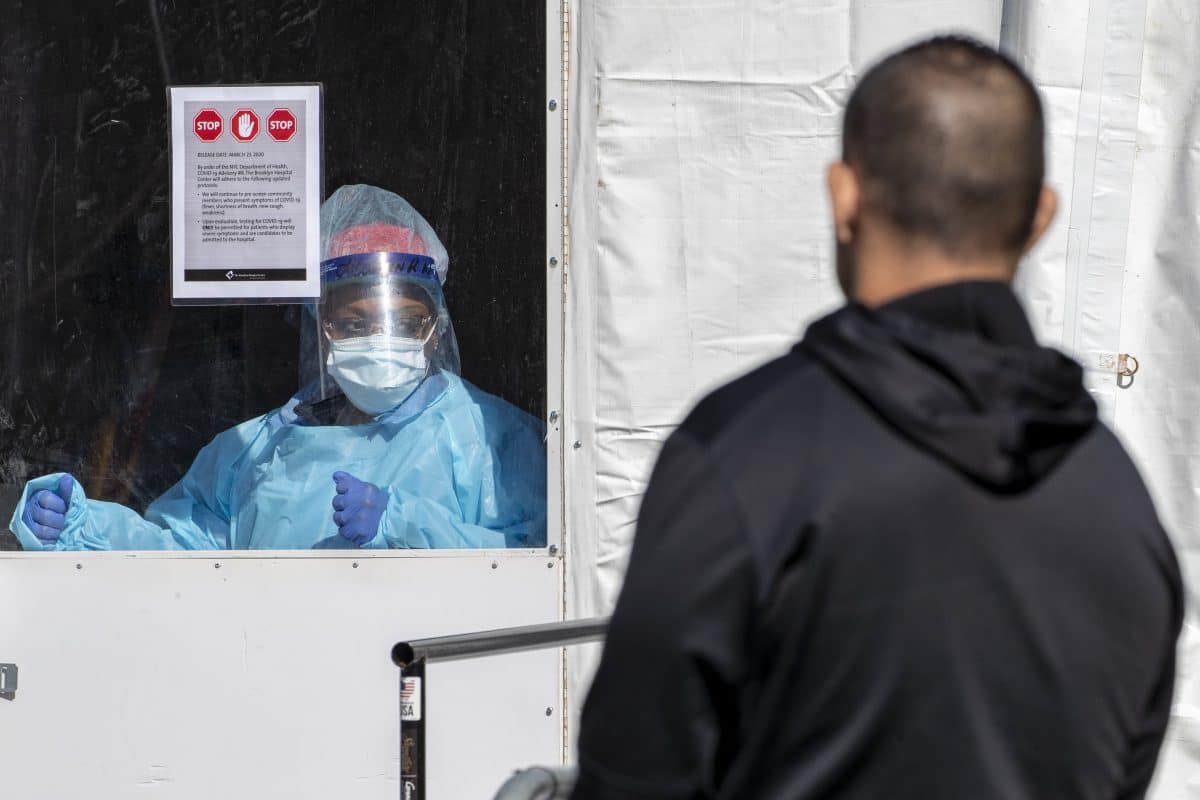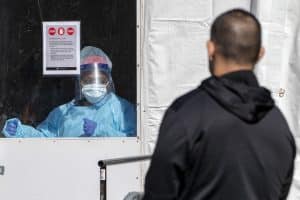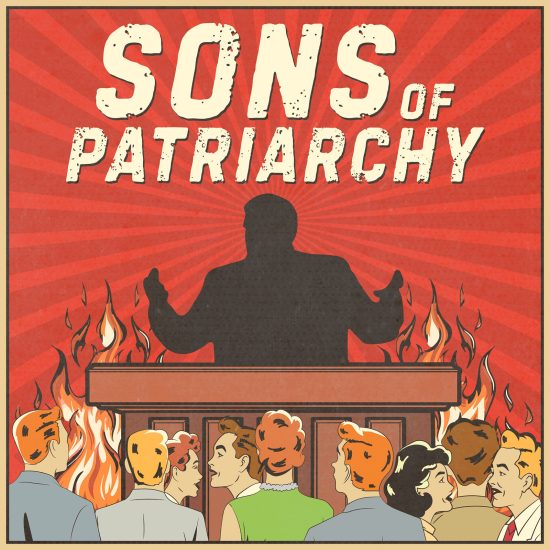
Baptist pastors are among the victims of the coronavirus outbreak as the global pandemic accelerates in the United States. Two black Baptist pastors were part of the first wave of people in the U.S. to die from the COVID-19 respiratory disease caused by coronavirus.

A member of the Brooklyn Hospital Center COVID-19 testing team calls in the next patient in line on March 26 in Brooklyn, New York. (Mary Altaffer/Associated Press)
As of March 29, more than 720,000 people globally have been infected with COVID-19, and more than 33,000 have died. In the U.S., the country with the highest number of infected persons, more than 140,000 have tested positive and more than 2,400 have died.
On Sunday, March 25, the longtime pastor of Macedonia Baptist Church in Harlem, New York, died after battling COVID-19. Isaac Graham, 66, had pastored the church, which is affiliated with the National Baptist Convention USA, for more than 40 years. Graham’s wife, Cheryl, took him to the hospital on March 16, where he was diagnosed with coronavirus and placed on a ventilator. He died six days later, with his wife unable to visit him.
“His last words to me were, ‘I love you,’” Cheryl told the local PIX11 News as she noted it wasn’t in person. “I was quarantined away from him.”
“I couldn’t even go to the morgue after he passed to see him because of the effects of the coronavirus,” she added.
The first person to die from COVID-19 in Baton Rouge, Louisiana, was the 60-year-old pastor of St. Luke Baptist Church. Leon Franklin had pastored the small church on the Mississippi River for 14 years. Franklin, who also worked at a Monsanto chemical plant, passed away March 18 after more than a week of feeling ill. He wasn’t initially tested for coronavirus, but was instead given an antibiotic and other medicine after a doctor’s visit. Still sick several days later, he didn’t lead church services on March 15 and went to a hospital the next day, where he was put on oxygen and finally tested. He died two days later.
“We will understand it better by and by. Our Pastor Rev. Leon Franklin transitioned on yesterday, went home to be with his God,” the church’s Facebook page posted. “Keep our First Lady and family in prayers. Earth has no sorrow Heaven cannot heal. Rest well Rev. We love you dearly!”
In addition to the clergy deaths, multiple Baptist church services have been identified as having someone who attended that later tested positive, thus raising concerns that others at the churches could’ve been exposed to the virus.
Bethany Baptist Church in Syracuse, New York, reported that someone who attended service on March 15 later tested positive, and thus the church encouraged people who attended that service to “be mindful of your activities and travel” through March 29, and to contact a doctor if they experience symptoms like a sore throat, body aches, difficulty breathing, and a fever above 100.4. The church closed the building and moved to livestream worship services until the outbreak ends.
“We have no desire to regulate who is welcomed in the House of God,” Phil Turner, the church’s pastor wrote on the church’s website. “We trust that God will cover and protect us from the pestilence that plagues the world. We extend our support and prayers for our visitor to have a speedy recovery and to know that they entered into a safe and loving environment.”
And the pastor of Crossroads Baptist Church in Bailey’s Crossroads, Virginia, tested positive after leading services on March 15 while unknowingly infected. The pastor spent several days recovering in the hospital.
Spread of coronavirus has been linked to multiple worship services across the country, in part since they can be large gatherings where people sit in the same room breathing the same air and touching common objects like doors and offering plates. After a March 15 service at a Pentecostal church in the Chicago, Illinois, area, 43 people are sick and 10 have already tested positive. And after services the weekend of March 8 at an Assembly of God church in Arkansas, 37 people tested positive and two have died.
In a March 25 conference call with clergy in Georgia, the state’s public health commissioner said that when examining the “hotspots” of the virus in the state, “virtually all these cases” are linked in part to “large church services.” Despite that, a national survey found 12 percent of U.S. churchgoers said their churches were still holding in-person worship services.






